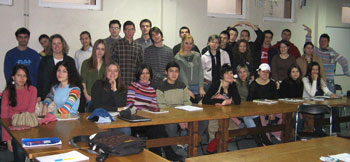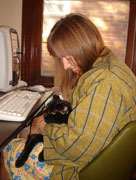Explore Ecampus
Earn a microcredential
Gain specialized skills quickly online, with the option to stack credits into a future degree.
Ecampus Faculty Highlight
December 2005
- Sociology instructors connect international students and cultures

Becky Warner's classroom in Bulgaria; Warner appears in back row, 3rd from left
Ecampus instructor Olga Rowe is passionate about teaching online, and says she’s not afraid to try new things in her virtual classroom. One such venture was the recent electronic merging of her introductory sociology class with Becky Warner’s SOC 204 class. Although online communication via forums is the norm in distance education, this instance was unique in that Warner’s classroom was on-site at the American University in Bulgaria (AUBG). Warner, who is chair of the sociology department at OSU, was in Bulgaria on sabbatical when the two instructors came up with the idea of combining their classrooms and conducting a kind of cultural experiment to study the conversations and reactions of students from their different cultural standpoints.
The students first introduced themselves in Blackboard, the online educational portal used by OSU. Then students were instructed to read "Horace Miners’ Body Rituals Among the Nacirema," a classic anthropological article on the strange behaviors and rituals of a mysterious culture. Rowe urged her students to read the article in an objective way, paying close attention to the text, and then discuss this culture with the others. Although Rowe said it’s common for students who converse online to openly share their opinions, the resulting conversations surprised even her. The content of the reading created strong reactions from some students, including an American student who commented that one particular ritual sounded extremely painful. That ritual ended up being a visit to the dentist – the culture studied in the writing was American culture. (Nacirema is American spelled backwards.) Discovering that also stirred up emotions. Rowe said it was a powerful learning experience for each student to slowly unravel the cover on this familiar culture.
Warner said she enjoyed watching her students in Bulgaria assist and learn from one another and their online counterparts. “Students learn that there is as much diversity within national cultures as there is across them. Not all Americans are alike; not all Bulgarians are alike.” She noted that within her classroom at AUBG she had students from eight different countries including Romania, Serbia and Mongolia. One interesting anecdote Warner shared was a Romanian student who said it was less confusing to communicate online than on-site. That was because in Bulgaria nodding up and down means “no” and side to side means “yes,” whereas in Romania it is the opposite, as in the US.

Olga Rowe
Olga Rowe received her Ph.D. from her native country of Ukraine, and has been teaching distance education courses for eight years. She said she appreciates the flexibility the online learning environment provides both the student and the instructor. She also feels online learning has two major benefits to students; one, it provides the opportunity for education to students who might not otherwise have it, and two, the way business is being performed online today, getting their education online prepares students for real-world possibilities.
“I feel great about the possibilities with teaching online, how it can be pedagogically innovative. This project would have been nearly impossible without technology. It would have been limited only to privileged students. Online education is the opportunity to combine many different cultures…it is really bridging the world.”
Features and Navigation
Media inquiries
If your publication would like to feature an OSU Ecampus online program, student or instructor, please contact Tyler Hansen.
For journalists
Gather quick facts about OSU Ecampus, our history and students on our webpage for members of the media.

